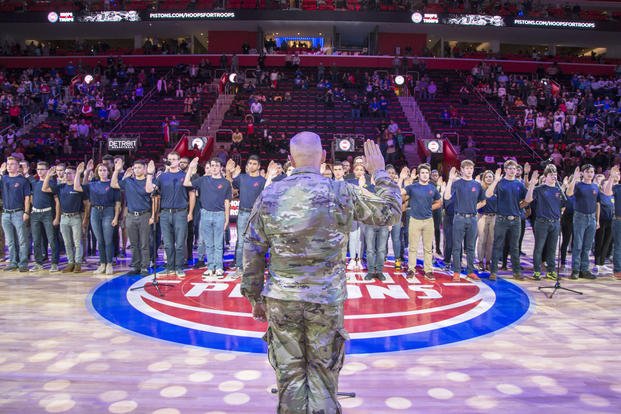For retired Rear Adm. Bob Besal, advocacy started small.
He'd heard from friends who were still in the Navy and holding senior positions in the service's recruiting command that qualified recruits were getting harder to come by. Those who had a clean criminal record and met basic height, weight and educational standards were a smaller portion of the recruitable population, and the Navy was forced to compete hard with civilian job fields to woo them.
In Besal's home state of South Carolina, he was particularly worried about the food kids get in schools. In a state with a lot of low-income students, school lunches were often high on sodium and low on fresh fruits and veggies. Overall, South Carolina ranked 7th among the 50 states for the percentage of 18-24 year olds who were overweight and obese from 2006 to 2008, and that percentage rose significantly over the past decade.
In 2010, he joined more than 120 retired general and flag officers in endorsing a damning report by the Washington, D.C.-based organization Mission: Readiness that declared the child obesity epidemic a national security issue. It urged the removal of junk food from American schools and increases in school lunch funding to allow for healthier food.
During his 30-year military career, Besal said he didn't spend much time thinking about the struggles facing American children. But this information, he said, was an "epiphany."
Related: One-Third of Youths Too Obese for Military Service, Study Finds
"I felt I could help the guys that are out there trying to do recruiting," Besal said. "The pool, the little pond that we dip in, was getting smaller due to folks not being eligible for military service, even if they wanted to join."
On Nov. 19, Mission: Readiness will mark its 10-year anniversary in Washington, D.C., with a keynote from retired Air Force Gen. Lori Robinson, until recently the highest-ranking female officer in the entire U.S. military.
Since the organization was created in 2009 under the Council for a Strong America, the problem of a shrinking recruitable population has remained dire. In 2010, according to the Mission: Readiness report, 75 percent of the recruitable population was ineligible to serve due to criminal history, weight issues or lack of education; in 2018, the group found 71 percent of adults 17-24 were ineligible.
"Estimates suggest that the recruitable population will stall at 29 percent through 2020," the 2018 report stated.
But members of the organization say their advocacy is part of a marathon effort to reduce dangerous trends and create conditions for healthier young people with more opportunities to succeed. And as Mission: Readiness enters its second decade, its cadre of retired general and flag officers has grown to more than 750, with active recruitment efforts ongoing.
While the country still faces a health crisis, Mission: Readiness' work has had an impact, said Jenny Wing Harper, vice president of Federal Policy and Strategic Communications. She pointed to advocacy for the Healthy Hunger-Free Kids Act of 2010, which authorized more funding for school lunch and nutrition programs, and a growing national awareness of the importance of early childhood education.
"It's really a continuum starting [the] first day that child is born and setting that child up for success," she said.
While there are many organizations calling for safer, healthier young Americans, the military background of the Mission: Readiness cadre and their message about national security may open doors that remain closed to others.
"When you're wearing the uniform, you can't pursue issues with your congressman, political issues," said retired Air Force Brig. Gen. Doug Pierce, who served a four-year stint as mayor of Norwalk, Iowa, following his 2008 retirement. "As a retired officer, you can directly go talk to them and bring up the subject."
Retired Air Force Maj. Gen. Cassie Strom retired in 2015 and got involved with the organization the following year. She said she was particularly interested in maintaining a diverse force, and had found that the prevalence of crime and drug abuse, in particular, in some communities had been detrimental to diversity.
"What troubles me is we're basically getting a stereotype of people joining the military, and I don't think that's effective for us when it comes to how we execute our mission," she said.
Moving forward, Strom added, she also wants to see pressure kept on legislators to fund early education and supplemental nutrition assistance, all of which support the success of children and teens.
"Anytime money's being allocated, there's pressure to not fund those kinds of things, and people [that benefit from that] have a smaller voice in our community," she said.
Harper said Mission: Readiness plans to place a more intentional advocacy focus on areas in which the propensity to serve in the military is historically high and obesity rates and dropout rates are also soaring, including the southeastern states.
"We're elevating these important issues out of the political fray," she said. "It shouldn't matter whether you're a Democrat or Republican. Our country, our economy, our families all do better when we're able to produce productive young adults as a country. Retired general officers are incredibly important to elevate their voices, talking about the national security implications and hopefully creating bipartisan will to move forward on these issues."
-- Hope Hodge Seck can be reached at hope.seck@military.com. Follow her on Twitter at @HopeSeck.
Read more: New Commissary, Exchange Access Delayed for Many Veterans













